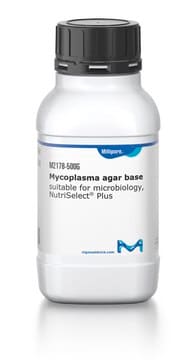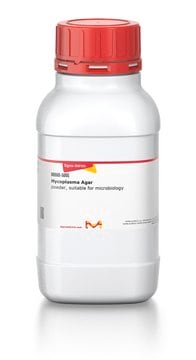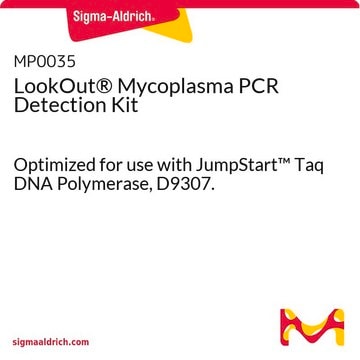M0535
Mycoplasma Broth
powder, suitable for microbiology
Synonym(s):
Mycoplasma media
About This Item
Recommended Products
form
powder
technique(s)
microbiological culture: suitable
solubility
H2O: 25.5 g/L (Autoclave at 121°C, 15 psi for 15 minutes. Store prepared medium at 0-5°C.)
application(s)
microbiology
Related Categories
General description
Application
Components
Preparation Note
1. Suspend 25.5 g of powdered medium in 1L of distilled water. Stir until the powder dissolves.
2. Adjust the pH of the solution to 7.8 ± 0.2.
3. Autoclave at 121 °C and 15 psi for 15 minutes to sterilize. Cool to 50 °C and add sterile supplements.
Storage and Stability
Other Notes
recommended
Storage Class Code
10 - Combustible liquids
WGK
WGK 2
Flash Point(F)
Not applicable
Flash Point(C)
Not applicable
Certificates of Analysis (COA)
Search for Certificates of Analysis (COA) by entering the products Lot/Batch Number. Lot and Batch Numbers can be found on a product’s label following the words ‘Lot’ or ‘Batch’.
Already Own This Product?
Find documentation for the products that you have recently purchased in the Document Library.
Articles
Detect mycoplasma contamination in cell culture through the PCR, DNA stain, or culture tests. Discover mycoplasma prevention, elimination, and detection kits.
Quality control guidelines to maintain high quality authenticated and contamination-free cell cultures. Free ECACC handbook download.
Overview on how to maintain proper cell culture laboratory safety including steps on performing lab risk assessments, surface disinfection, biohazard and waste removal. Free ECACC handbook download.
Overview of good cell banking practices for cell line cryopreservation purposes.
Our team of scientists has experience in all areas of research including Life Science, Material Science, Chemical Synthesis, Chromatography, Analytical and many others.
Contact Technical Service





